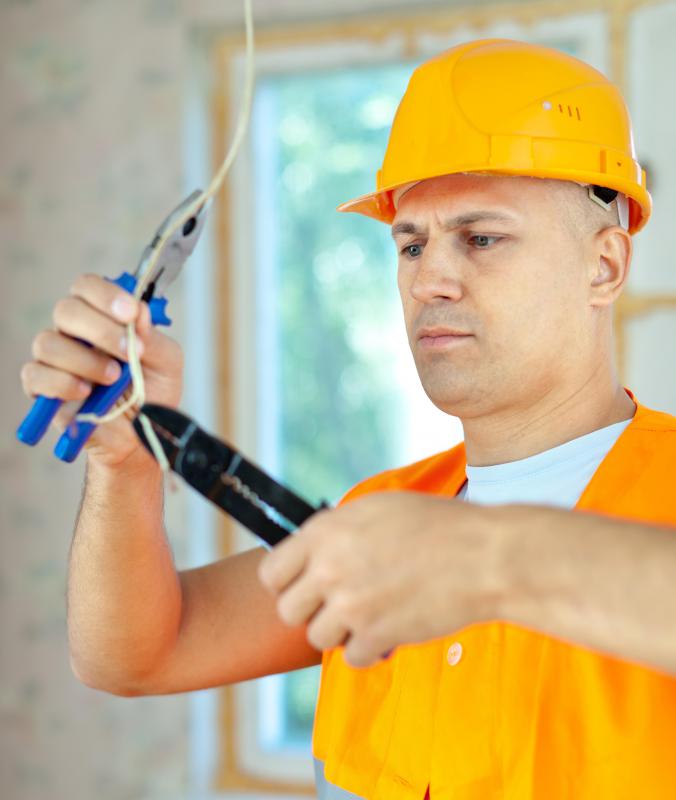At WiseGEEK, we're committed to delivering accurate, trustworthy information. Our expert-authored content is rigorously fact-checked and sourced from credible authorities. Discover how we uphold the highest standards in providing you with reliable knowledge.
What does an Electrical Technician do?
Electrical technicians are responsible for maintaining, testing, developing, repairing, and designing electrical wiring and equipment.
Communication equipment, navigational devices, medical monitoring machines and other innovative pieces of technology have all been developed by electrical technicians. Everyday pieces of machinery used across the globe, from computers to cellular phones, rely on the work of electronic engineers and technicians worldwide.

Depending on the type of background and position an electrical technician has, his or her work can vary. Most are well versed in basic electrical knowledge, such as when dealing with circuit breakers and electrical wiring. Technicians who work in research and development typically conduct experiments, test new designs, and collect technological data. Others might specialize entirely in computer programs, such as Computer Aided Design (CAD)

Technicians who work in the manufacturing business might design or produce new products. Others might work in quality control. Their jobs include processing and inspecting various products, collecting data, and making sure that products meet safety, quality, and environmental standards. Technicians in the aerospace field might work on flight technology and development, which requires testing equipment as well as gathering and interpreting relevant data.

Mathematics, engineering, science, and other areas of study are employed by electrical technicians on a daily basis. These journeymen rely on the latest research and technology to perform their duties. They might solve problems for various industries, including construction, environmental engineering, maintenance, the armed forces, education, manufacturing, automotive development, civil engineering, sales, or inspection. Many are also self-employed.

Sometimes an electrical technician can be confused with an electronic technician. While similar, the two differ. His or her job encompasses a wider range of responsibilities, including those listed above. In contrast, a worker who solely repairs electrical equipment and electronic devices is known as an electronic technician.
The job outlook for an electrical technician can vary by location and economic conditions. Some specialties are needed more than others, depending on local business and community needs. Postsecondary education, such as an associate degree or higher, is recommended for optimal job placement. Such degrees can be earned in engineering technology or other relevant fields. Salaries vary, though the position is considered to be a fairly lucrative career.
AS FEATURED ON:
AS FEATURED ON:

















Discussion Comments
@David09 - I agree, and I'd just add that if you like working with moving parts as well as electricity, you might want to consider becoming an electrical mechanical technician as well.
You can work in an industrial plant, for example, troubleshooting hydraulic pumps and motors in addition to making electrical repairs.
It could help you expand your skills so that you can pursue other engineering opportunities down the road.
I say if you want job security and are willing to learn a trade, there are two career paths for you: the electrician and the plumber; take your pick. The fact is we will always need both in one way or another.
Electrical technician training takes far less time than a college degree, two years in most cases. You can become a certified electrician in your state, hang your shingle up, and you’ll have more work than you can handle.
As a case in point our house suffered a powerful storm recently and we had several sockets in the house go out. We didn’t get a direct lightning strike but we did get a knockout. We had to call the electrician to fix the problem and he charged us a substantial hourly wage, but he got the job done.
Post your comments